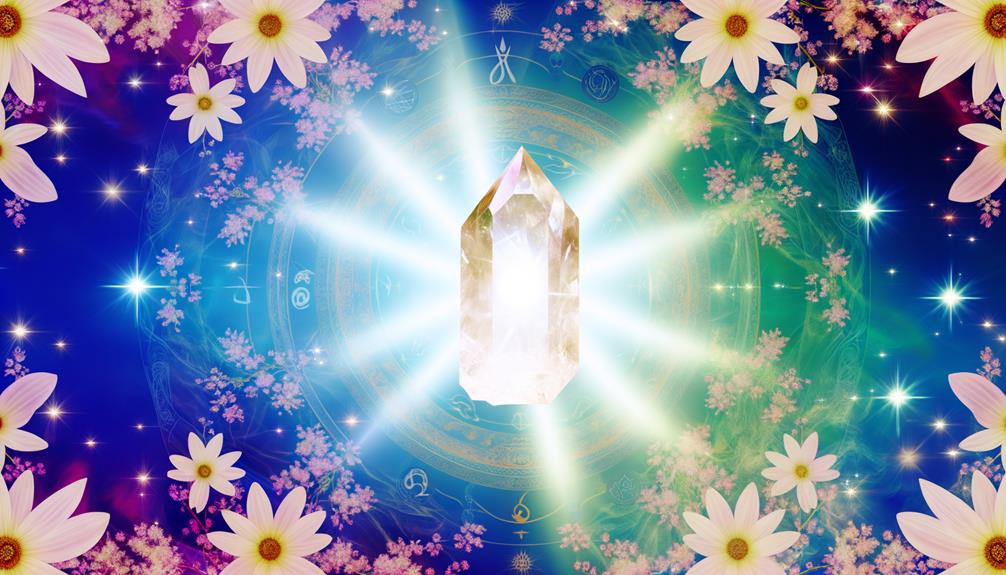Crystal Name Meaning and Origin
The name 'Crystal' derives from the Greek word 'krystallos,' historically linked to clear quartz, perceived as eternally frozen water. Its etymology traces back to ancient Greece, reflecting the gemstone's clarity and purity.
Crystals were admired for their mystical and aesthetic allure across ancient civilizations, symbolizing healing, protection, and spiritual insight. Surging in popularity during the 1980s and 1990s, the name 'Crystal' has been associated with notable figures like Crystal Gayle and Crystal Dunn.
Variations include 'Krystal' and 'Kristal.' Understanding the significance and cultural importance of this name offers deeper insight into its enduring appeal.

Key Takeaways
- 'Crystal' originates from the Greek word 'krystallos,' meaning clear quartz or frozen water.
- The name 'Crystal' symbolizes clarity, purity, healing, strength, and mysticism.
- Popularity surged in the 1980s and 1990s, ranking within the top 50 names for girls in the U.S.
- Crystal has been revered for its mystical and aesthetic properties throughout history.
- Variations include 'Krystal,' 'Cristal,' and 'Kristal,' with common diminutives 'Crys' and 'Crysie.'
Historical Background
The name 'Crystal' finds its origins in the Greek word 'krystallos,' meaning ice or clear rock, which reflects its historical association with purity and transparency.
Historically, crystals were revered for their purported mystical properties and aesthetic allure. In ancient civilizations, such as Greece and Rome, crystals were often used in religious ceremonies, symbolizing clarity of mind and spiritual purity.
During the Renaissance, they were believed to possess healing properties and were integral to the practice of alchemy. The Victorian era saw the rise of crystals in jewelry, emphasizing their beauty and perceived metaphysical benefits.
Over centuries, the allure of crystals has permeated various cultural and societal practices, cementing their status as symbols of elegance and purity.
Etymology
The etymology of the name 'Crystal' can be traced back to the Greek word 'krystallos,' which originally referred to both ice and rock crystal, believed to be a form of eternally frozen water.
Over time, the term evolved through various linguistic adaptations, eventually entering the English language with its current meaning.
This linguistic journey reflects the changing perceptions and cultural significance of the substance itself.
Greek Word "Krystallos"
Derived from the ancient Greek word 'krystallos', which means 'ice' or 'frozen', the term 'crystal' reflects the historical belief that clear quartz was eternally frozen water. This etymology underscores the Greeks' profound connection with natural phenomena and their attempts to explain them.
The perception of quartz as a form of perpetual ice speaks to the crystalline structure's clarity and its resemblance to ice. This belief persisted through various cultures and epochs, influencing scientific and metaphysical interpretations of crystals.
The Greek understanding of 'krystallos' as something both natural and mystical laid the groundwork for the term's enduring legacy, encapsulating the intersection of natural science and ancient mythology. Consequently, 'krystallos' is foundational in comprehending both historical and contemporary views of crystals.
Evolving Linguistic Usage
Throughout history, the linguistic evolution of the term 'crystal' has mirrored humanity's expanding understanding of natural phenomena and materials. Originating from the Greek 'krystallos', meaning ice, the term evolved in parallel with scientific advancements. In medieval Latin, 'crystallus' referred to both ice and clear rock crystal, symbolizing purity.
Key transformations in its usage include:
- Ancient Greece: Linked with frozen water.
- Medieval Europe: Signified quartz and clarity.
- Renaissance: Broadened to include gemstones.
- Modern Science: Characterized by crystallography and solid-state physics.
- Contemporary Era: Widespread in technology, for instance, liquid crystal displays (LCDs).
Therefore, 'crystal' has consistently adjusted, mirroring humanity's increasing understanding of the natural and technological world.
Cultural Significance
The cultural significance of crystals spans from their historical uses in ancient civilizations to their application in modern wellness practices.
Crystals have been imbued with symbolism in various cultures, often representing healing, protection, and spiritual insight.
Understanding these multifaceted roles provides a thorough view of their enduring impact across different societies.
Historical Uses of Crystals
In various cultures throughout history, crystals have been revered not only for their aesthetic appeal but also for their perceived mystical and healing properties. Ancient civilizations utilized crystals in diverse and significant ways:
- Egyptians: Amulets made of crystals like lapis lazuli and carnelian were believed to offer protection and health.
- Greeks: Crystals such as quartz were thought to be eternally frozen ice, symbolizing purity.
- Romans: Wore crystals like amethyst to prevent intoxication and enhance clarity.
- Chinese: Jade was venerated for its supposed ability to bring harmony and longevity.
- Indigenous Tribes: Used crystals in spiritual ceremonies to connect with the divine and ancestors.
These historical practices underscore crystals' broad cultural significance and their integral role in various spiritual and medicinal traditions.
Crystals in Modern Practices
Although rooted in ancient traditions, the cultural significance of crystals has evolved, manifesting in contemporary practices that blend spirituality with holistic wellness. Modern crystal usage is deeply intertwined with practices like meditation, energy healing, and personal growth.
Crystals are often employed in Reiki sessions, where practitioners believe they enhance the flow of life energy. Additionally, they are integrated into mindfulness routines, serving as focal points for meditation and stress relief.
The rise of wellness culture has propelled crystals into the mainstream, with many advocating their purported benefits in emotional balance and mental clarity. This blend of ancient wisdom and modern methodologies underscores the enduring appeal and adaptive nature of crystals in contemporary society.
Symbolism in Different Cultures
While the integration of crystals into modern wellness practices highlights their contemporary relevance, their symbolic meanings across different cultures reveal a rich tapestry of historical and spiritual significance. Various civilizations have attributed distinct meanings to crystals, often associating them with healing, protection, and spiritual enlightenment.
This cultural symbolism is multifaceted:
- Ancient Egyptians: Used lapis lazuli for protection and to ward off evil spirits.
- Chinese Culture: Jade symbolizes purity and moral integrity, often used in burial rites.
- Hindu Tradition: Quartz is linked to the crown chakra, enhancing spiritual awareness.
- Native American Beliefs: Turquoise represents the sky and water, fostering communication with the spirit world.
- Greek Mythology: Amethyst was believed to prevent intoxication and promote clarity of mind.
These diverse interpretations underscore the universal allure of crystals.
Popularity Trends
The name Crystal experienced a significant surge in popularity during the late 20th century, particularly in the 1980s and 1990s, as evidenced by various naming trend analyses. This rise can be attributed to its phonetic appeal and the cultural fascination with unique, nature-inspired names during that period.
Data from the Social Security Administration indicates that Crystal consistently ranked within the top 50 names for girls in the United States throughout the 1980s. However, its popularity began to wane in the early 2000s, reflecting broader shifts in naming preferences.
Famous Namesakes
Among the notable individuals bearing the name Crystal, several have made significant contributions to various fields, including entertainment, sports, and literature. These influential figures have not only achieved personal success but also left a lasting impact on their respective domains.
- Crystal Gayle: Renowned American country singer known for her hit song 'Don't It Make My Brown Eyes Blue.'
- Crystal Dunn: Acclaimed soccer player who has represented the United States in international competitions.
- Crystal Reed: Versatile actress recognized for her roles in popular television series.
- Crystal Renn: Prominent fashion model celebrated for her work in body positivity.
- Crystal Mangum: Author and activist known for her involvement in high-profile legal cases.
These individuals exemplify the diverse arenas in which the name Crystal has been prominently featured.
Variations and Nicknames
Exploring the variations and nicknames associated with the name Crystal reveals a rich tapestry of linguistic adaptations and cultural influences. Common diminutives include 'Crys' and 'Crysie,' which offer a sense of intimacy and affection.
Variations such as 'Krystal' and 'Cristal' reflect phonetic shifts and regional preferences, often influenced by cultural and linguistic contexts. In Slavic regions, the name may transform into 'Kristal,' showcasing the phonological adaptation within those languages.
Additionally, hybrid forms like 'Krystle' suggest a blend of modern and traditional naming conventions. These variations and nicknames not only underscore the name's versatility but also highlight the diverse ways in which Crystal has been embraced across different cultures and linguistic landscapes.
Symbolic Meanings
Beyond its variations and nicknames, the name Crystal carries profound symbolic meanings that resonate through various cultures and historical contexts. Crystals are celebrated for their clarity, purity, and multifaceted beauty, reflecting the essence of the name.
In diverse traditions, crystals are imbued with metaphysical properties and spiritual significance. These symbolic attributes encapsulate important concepts:
- Clarity: Representing clear vision and insight.
- Purity: Symbolizing innocence and untainted nature.
- Healing: Associated with restorative powers and well-being.
- Strength: Reflecting resilience and enduring qualities.
- Mysticism: Linked to spiritual and metaphysical domains.
Such symbolism underscores why the name Crystal is cherished, evoking a sense of elegance and depth that transcends mere nomenclature. It is no wonder that parents seek out this name for their daughters, hoping to bestow upon them the same sense of grace and beauty. The Debra name meaning is rooted in Hebrew origins, signifying a bee, which also conveys hard work and productivity. Together, the names Crystal and Debra hold a powerful significance that speaks to both inner and outer radiance.
Conclusion
The name Crystal, with its historical roots and multifaceted cultural significance, gleams like a diamond through the annals of time. Its etymology reveals a linguistic journey as clear as the mineral it denotes.
Popularity trends and notable namesakes further illuminate its enduring appeal. Variations and nicknames add layers of depth, while symbolic meanings imbue it with a mystic resonance.
Essentially, the name Crystal encapsulates a rich tapestry of history, culture, and symbolism, shimmering with timeless allure.






